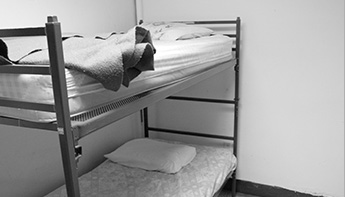We looked at data from a three-year period, 2013 to 2015. Our goal was to determine the scope and causes of Michigan’s homeless veteran problem. As we discovered, addressing disabilities – medical, mental and substance abuse-related – will be a key to addressing an issue that is clearly on the rise.
Veterans comprise an estimated 11 percent of the adult homeless population in our country, according to the National Coalition for Homeless Veterans, citing data from the U.S. Department of Veterans Affairs (VA). As our data shows, the percentage is slightly lower in Michigan. Between 2013 and 2015, veterans accounted for roughly 6-7 percent of the state’s total homeless residents.
However, the problem of veterans’ homelessness is growing in the state. Over the three-year period we analyzed, the number of homeless veterans in Michigan rose by 14.5 percent, mirroring a 14.8 percent increase in the state’s overall homeless population. It is a tragedy when those who have served our country are left without a roof over their heads. It is incumbent upon us all to seek practical solutions. It starts by determining the root causes of homelessness among Michigan’s veterans.
Based on our analysis, we found disability to be the driving force behind veterans’ homelessness. Our data indicates that 64.7 percent – or two out of every three homeless veterans in Michigan – suffers from some form of disability. Those disabilities generally fall within three categories:
Roughly one-fourth of active military members suffer from mental health issues, including post-traumatic stress disorder (PTSD), a recent study found. Those mental health problems can linger as veterans try to adjust to civilian life. Our data shows that 56 percent of Michigan’s homeless veterans suffer from a mental health disorder.
Every year, on average, 44 percent of Michigan’s homeless veterans suffer from a medical disability, our data shows. One disability that merits special attention: Traumatic brain injury. The Congressional Research Service describes TBI as being the “signature wound” of our recent military operations in Iraq and Afghanistan.
As our data indicates, 35 percent of Michigan’s homeless veterans have a substance abuse-related disability. The National Coalition for the Homeless notes that addiction to alcohol and other drugs, including pain medication, can serve as both a cause and a result of homelessness.
The following section is aimed at directing veterans in Michigan who are homeless or facing the risk of homelessness towards resources that can help them with finding food, shelter, health care and other services.

Food pantries and community kitchens

Temporary shelter and supportive housing

Medical care, counseling and training
What is being done in your community to help homeless veterans? Your ideas and activities can inspire others. If you are looking for ways to become involved, consider the following three suggestions:

You can volunteer your time at food banks, community kitchens, homeless shelters or VA medical facilities. You can also volunteer your time at Veterans Stand Down events, which provide supplies and other services to homeless veterans.

If you lack time to volunteer but still want to help those who are on the front lines of battling veterans’ homelessness, you can make a financial donation to an organization such as the National Coalition for Homeless Veterans.

Help homeless veterans in Michigan by keeping tabs on bills, get in contact with your local representative, and follow federal legislation on Veterans' issues at the Disabled American Veterans (DAV) website.